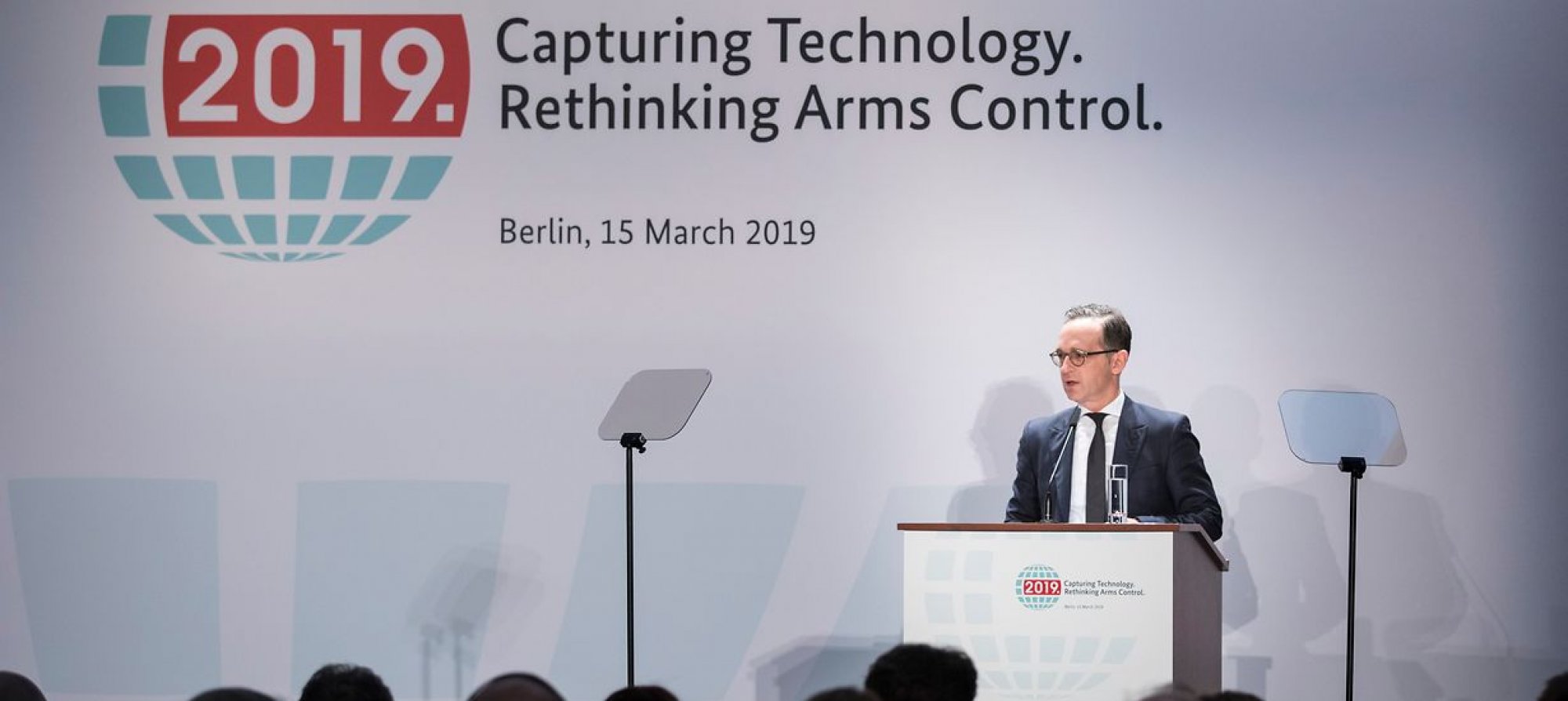Florian Gaertner/photothek.net

Regulating new military technologies
New technologies have reached the military realm and their possible impact is beginning to cause a headache for governments and military experts alike. Discussions are currently focused on four areas: lethal autonomous weapons, or so-called ‘killer robots’, biotechnologies, cyber weapons, and new missile technology.
For most of these technologies, there are no international rules in place.
This comes amid a general crisis of the international arms control regime, caused by the U.S. withdrawal from the Intermediate-Range Nuclear Forces (INF) Treaty and the potential ramifications this could have on the extension of the New START Treaty, which expires in 2021. Some experts already speak of a complete breakdown of the arms control regime and warn of a general militarization of international relations.
“We must find solutions for the technological challenges of tomorrow. In a nutshell, we must rethink arms control,” German Foreign Minister Heiko Maas said in his opening speech of a high-level arms control conference at the German Foreign Ministry in Berlin on 15 March, bringing together 450 diplomats and experts.
By hosting this conference, Germany is at the forefront of an initiative to discuss the impact of new technologies on future warfare and on arms control. “We are of the opinion that a new start can only succeed if we work side by side – parliamentarians and government representatives, as well as think tanks, researchers, military experts and industry representatives,” Maas said in Berlin.
Margot Wallström, the Swedish Foreign Minister, and Stef Blok, the Foreign Minister of the Netherlands, came to Berlin to support Germany in this endeavour. The three foreign ministers issued a joint declaration in which they stressed the “utmost importance that we now analyse closely potential negative and positive effects of new technologies, and identify the need for further regulation and new arms control arrangements in order to maintain international peace and stability”.
Killer robots
One major issue of concern are lethal autonomous weapons (or killer robots) that attack targets without human intervention. Such weapons systems are particularly prone to manipulation and miscalculation, thus increasing the risk of accidental wars. One example are kamikaze drones that attack targets without a human taking the decision.
Ethical considerations are also a major issue of concern, as there are currently no rules who can be held responsible for an act of aggression if there is no human decision or control behind. This point was also underlined in a study by the German Institute for International and Security Affairs, presented on the margins of the conference: “From an ethical perspective, lethal autonomous weapons systems are particularly problematic with regard to human dignity, because robots do not understand what it means to kill a human being”.
Discussions are currently ongoing at the United Nations in Geneva within an expert group, with Germany and France hoping to make tangible progress. “We are committed to this in Geneva right now, and we want to make progress here this year. We want to enshrine the principle of effective human control over all lethal weapons systems at the international level, thereby taking a major step towards the global prohibition of fully autonomous weapons,” Maas emphasised in his opening speech in Berlin.
Germany and France are faced with two additional groups of states in Geneva. “One group of 28 states, among them Austria, wants an immediate ban for all autonomous weapons systems, agreed in an international treaty. Another group of states is opposed to this, among them the U.S., Russia, Israel and Australia, as they prefer to continue developing such systems,” explains Dr. Frank Sauer, senior researcher at the Bundeswehr University Munich.
Biotechnologies
Biological weapons as such are not new, however new technologies make them more dangerous. According to a report published by the Stockholm International Peace Research Institute (SIPRI) on the occasion of the Berlin conference, “the convergence of developments in biotechnology with other, emerging technologies such as additive manufacturing [3-D printing], artificial intelligence and robotics has increased the possibilities for the development and use of biological weapons”.
“Each of these technologies could, in its own way, facilitate the development, production and use of biological weapons, and make them more dangerous,” said Kolja Brockmann, Researcher at SIPRI and lead author of the report.
“The increased use of robots in laboratories could lead to significant gains in productivity during the design-build-test cycle of biological weapons, while artificial intelligence could be used to find new ways to optimize the transmissibility or virulence of a biological agent,” Dr. Vincent Boulanin, Senior Researcher at SIPRI on emerging technologies, added.
The 1972 Biological and Toxin Weapons Convention, the main treaty governing biological arms control, is “ill-equipped to comprehensively address these risks”, experts from SIPRI warn in the report.
Governments are particularly concerned about the misuse of biological weapons by terrorists and other non-state actors. German Foreign Minister Heiko Maas therefore announced in Berlin that “the Federal Government will therefore work to establish a permanent body of experts and scientists under the umbrella of the Biological Weapons Convention – one that clearly identifies risks and informs and advises states as to them”.
Cyber weapons
Rapid developments in the cyber sector have also reached the military realm. Cyber warfare is already happening, with states or non-state actors attacking another state’s IT infrastructure, or other important infrastructure such as banking system, through the use of computer viruses or other malware.
“Identifying the responsible party behind malicious cyber incidents is a necessary prerequisite for holding these actors accountable, but there are many challenges that accompany cyber attribution,” experts from the RAND corporation stated in January.
Foreign Minister Maas called for “universal behavioural norms and standards in cyberspace” in his speech and also made reference to efforts within the OSCE, the only international organisation that has agreed on politically-binding confidence-building measures for the cyber space.
Hypersonic missiles
New technologies have also found their way into missile systems. One of the main concerns here are hypersonic missiles, capable of flight at speeds of Mach 5 and above as they leave very little time for humans to react.
“The fact that we’re not just talking about science fiction here is demonstrated by Russia’s announcement that the first Avangard systems will be entering service this year,” Foreign Minister Maas said in Berlin.
As worldwide concern is growing about these new developments, Maas seized the opportunity of the conference in Berlin “to establish an international missiles dialogue that takes into account both the challenges posed by new technologies and the dangers of their proliferation”.
A role for the OSCE?
Arms control remains an important part of the global security architecture. The expert conference in Berlin showed that the arms control regime needs to evolve to adapt to changes not only in the political and strategic spheres, but also taking into account rapid technological changes.
The OSCE, as a regional arrangement in the sense of Chapter VIII of the Charter of the United Nations, could be used in this endeavour as a platform to exchange information on new military technologies and thus build confidence and increase transparency and predictability. The regular military doctrines seminars could be a first starting point.
Achieving a global understanding on UN level (in Geneva) first would, however, also make sense, as this includes key states such as China, India or Australia, which are not part of the OSCE.
To learn more about this topic, read our interview with Dr. Ulrike Franke, policy fellow at the European Council on Foreign Relations.



Comments
* Your email address will not be published